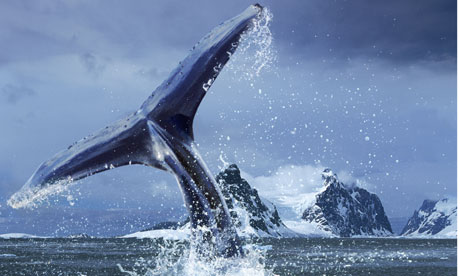| Reply to Thread New Thread |
|
|
#1 |
|
|
New research suggests that whales use their sophisticated communication techniques to develop distinct and separate cultures. Biologist Hal Whitehead and writer and self-confessed 'whalehead' Philip Hoare discuss this new frontier
 Whales are not only the largest animals that have ever lived – they are also among the most intelligent, and yet we still know very little about them. New research, however, suggests that sperm whales at least use sophisticated communication techniques to develop distinct and separate cultures. Here to discuss the latest in cetacean research to mark next month's Peninsula Arts Whale Festival, are Philip Hoare, a self-confessed "whalehead" and author of Leviathan or, The Whale, winner of the 2009 BBC Samuel Johnson Prize, and Dr Hal Whitehead from Dalhousie University in Halifax, Nova Scotia, a world expert on sperm whales. Philip Hoare We're talking about our two disciplines, which meet on a very specific subject, the whale. There are those who work with this animal from a scientific point of view and those work with them from an artistic or literary point of view. What fascinates me is that whatever we do, the whale always remains elusive. For us as writers and artists, it is elusive because it is beyond description. I quickly ran out of superlatives talking about whales when I was writing Leviathan or, The Whale. But for you as a scientist it is elusive in that it is very difficult to study in the environment in which it lives. What first drew you to the sperm whale? Hal Whitehead It's much more exciting to go for something that we really don't know. I think that of all animals, the sperm whale is the one with the greatest mystery, and that I find very attractive. And I am assuming this is what attracts writers and artists to the same animal. PH That's precisely right. For me there is a degree of romance about the subject. Writing about whales has brought me into close contact with scientists and given me a new understanding about the animal. Your book Sperm Whales: Social Evolution in the Ocean talks about sperm whale culture, but what do you mean by "culture" when you apply it to this animal? HW When a biologist like myself starts talking about culture eyebrows are raised in other disciplines among scholars who see themselves as the "knowers" of culture. But, for a biologist, culture is primarily a flow of information – both ideas and behaviours – between the members of a population, which happens because they learn from each other. The flow of information is what biology is about. Without information getting from one animal or plant to another, there would be no life. We as biologists have concentrated on genes as the way information gets around, but there are other ways in which this can happen, and culture is one of them. Culture leads to a whole new range of processes, which don't happen in most animals or plants. The possibility that there are other groups of animals that have these flows of information, running through their population and interacting in extraordinary ways, is most intriguing. In the case of the sperm whale, we have a creature of great mystery and potential. We tried to explain what we found using the principles of genetic evolution but we found things we couldn't explain, so we had to think about other processes. The process that made sense was culture. For example, I was studying a group of whales off the Galápagos Islands, looking at their social systems, and found two kinds of sperm whale who were behaving really quite differently. They had different ways of communicating with each other, different ways of using the resources around the island, etc. The initial explanation was that we had two sub-species but there was virtually no difference genetically. So something else was causing these sperm whales to form radically different societies, with radically different ways of behaving. It became obvious that the only explanation was that these whales had different cultures. They were living in a multicultural society. ... read the rest here: http://www.guardian.co.uk/science/20...-hal-whitehead absolutely fascinating to see the word "culture" applied to species other than humans. |
|
|
| Reply to Thread New Thread |
«
Previous Thread
|
Next Thread
»
| Currently Active Users Viewing This Thread: 1 (0 members and 1 guests) | |
|
|





 Linear Mode
Linear Mode


